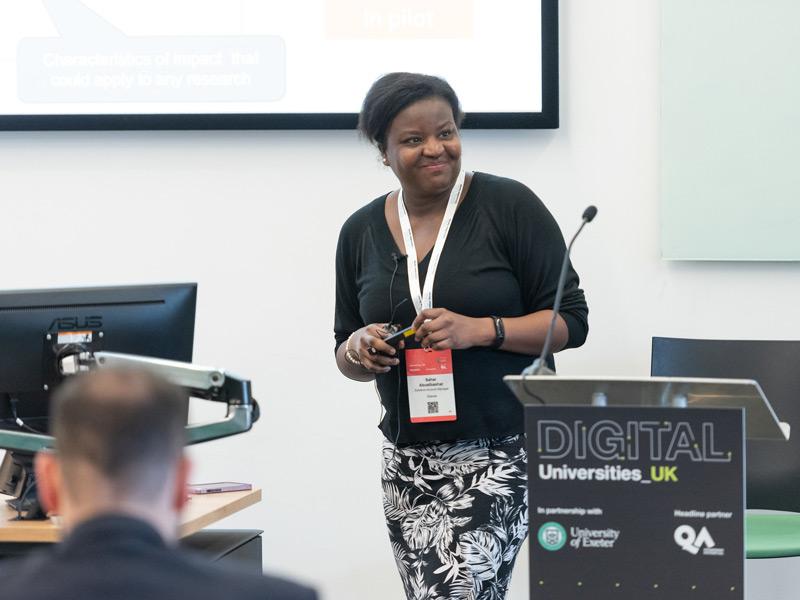There are few hotter topics than generative AI and its impact on society. What is beyond question is that it will be a powerful labour-saving device in many workplaces, including academia. Scopus AI, an intelligent search tool developed by information analytics specialist Elsevier, harnesses the data-crunching power of generative AI to empower academics to produce faster, deeper research insights.
Speaking at the 2024 THE Digital Universities UK event, Sahar Abuelbashar, solutions account manager for research intelligence at Elsevier, said Scopus AI is designed to make researchers’ lives easier. “The idea is that this can help you get to the answer as quickly as possible,” Abuelbashar said. “It is there to ask the question and the information will appear.”
From a user experience standpoint, it really is that simple. As with generative AI’s pop-culture superstar ChatGPT, simply ask a question of Scopus AI and it will respond in a matter of seconds. “You can literally just ask it any question you want and it will produce a summary for you,” Abuelbashar said. All of Scopus AI’s answers are based on scholarly outputs that are indexed on Scopus. Scopus is citation neutral. Its database is populated by more than 27,800 peer-reviewed journals and more than 330,000 books.
Scopus AI presents users with three levels of confidence in its summaries. If confidence is low, it might ask them to refine the question and check the summaries carefully. Abuelbashar said Elsevier has put a lot of effort behind the scenes to minimise issues such as hallucination and data bias.
Citation links help users understand how Scopus AI has arrived at its summaries, and there is the opportunity to make deeper interrogations of the summary using the Scopus database. “You get cited references for validation and transparency,” Abuelbashar said. “It really does give you as holistic picture as possible. It allows you to deepen your exploration.”
The next level of support offered to Scopus AI users involves research impact narratives. “We know that actually tracking the impact of research itself can be quite tricky so we are doing quite a lot of exploratory work to look at impact,” Abuelbashar said. Impact can be difficult to measure and open to interpretation, but Elsevier is using the Research Excellence Framework to shape its impact reports.
Consultation with industry stakeholders is a crucial component of Elsevier’s work. Abuelbashar said data must be open and transparent, with a focus on the real-world impact of generative AI tools.
“We are going through the next phase of our solution with generative AI,” she said. “We are talking with industry leaders, researchers and research administrators around the world, and we are looking at the whole academic evaluation framework. We are looking at how to support universities through your input stage to output and impact stage.”
After a successful pilot, Scopus AI has now been officially launched. Elsevier is currently testing similar AI-driven search tools for its ScienceDirect and ClinicalKey offerings.
The speaker:
- Sahar Abuelbashar, solutions account manager for research intelligence, Elsevier


comment